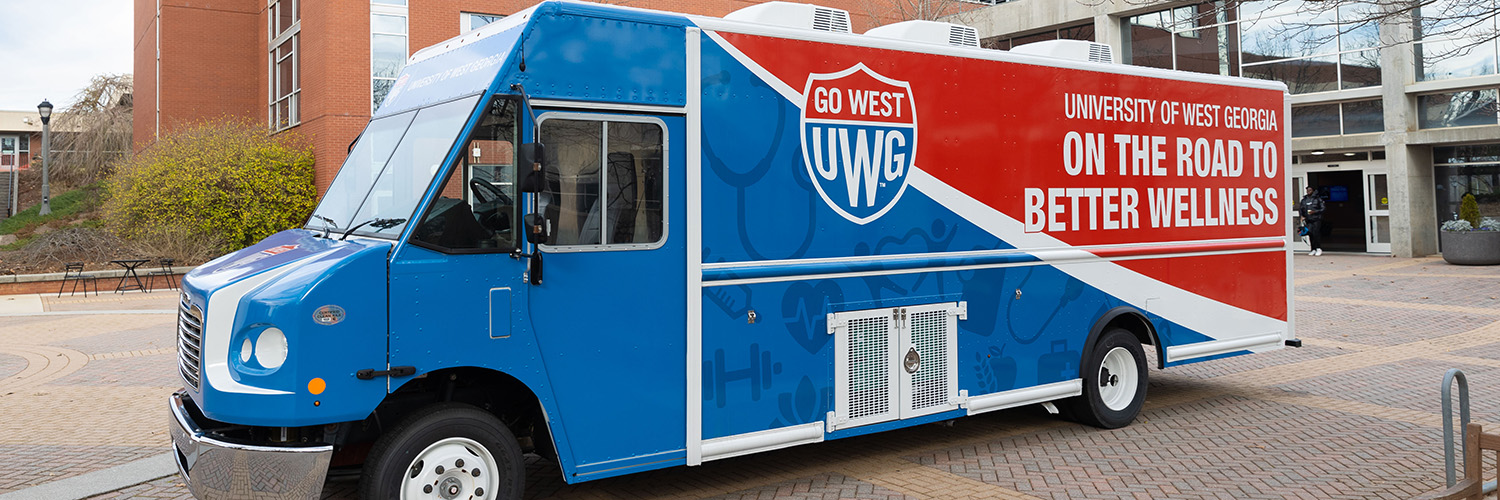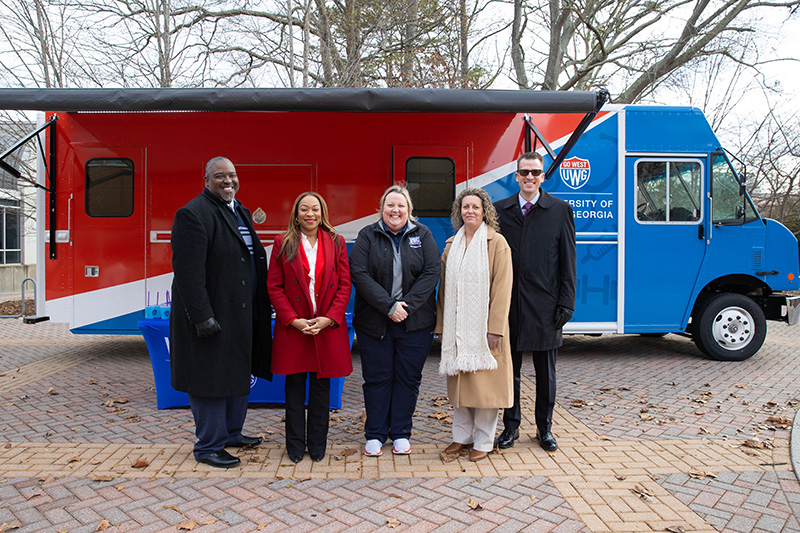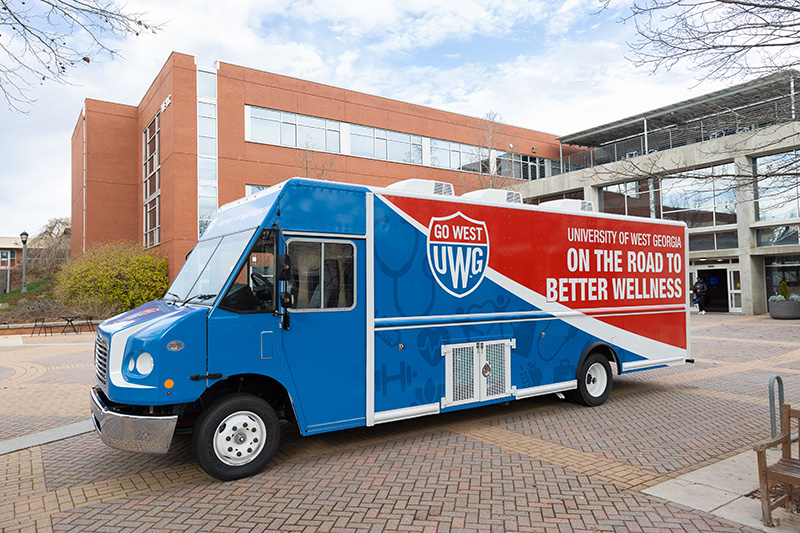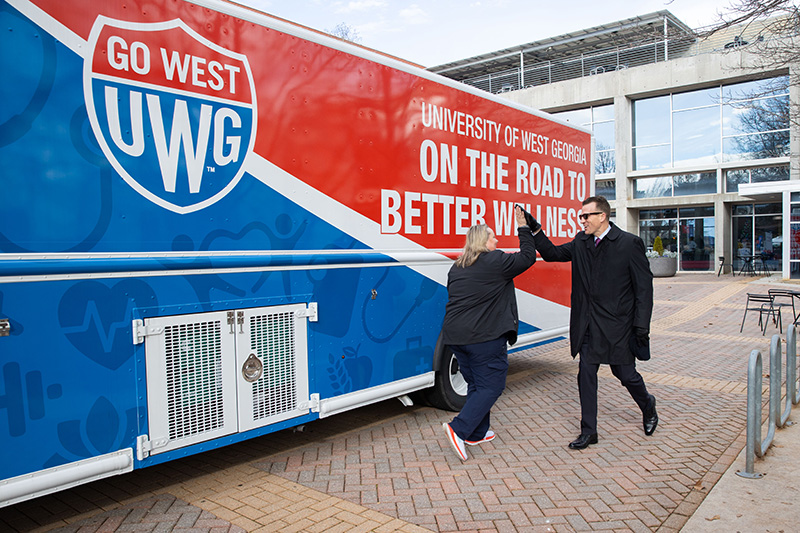
on the road to better wellness
UWG Unveils Mobile Health UnitShare this page
At the University of West Georgia, wellness and community form two cornerstones of student achievement, supporting academic endeavors, extracurricular pursuits and personal growth.

What began as a rudimentary drawing in alumna and Chief Wellness Officer (CWO) Bridgette Stewart’s home has now materialized into a medical clinic on wheels, providing not only students with hands-on experiential learning but also prioritizing the well-being of the greater Carrollton and neighboring communities.
“We have many underserved communities in and around Carrollton that simply don’t get basic wellness care and prevention education due to lack of insurance or transportation and language or financial barriers,” Stewart ’03 said. “We need to get to them. The unit was designed specifically to provide cost-effective, preventative wellness education care to the community while also providing innovative experiential learning opportunities for students.”
Well-being is a concept hardwired into the identity of UWG. The Wolf Wellness Lab – an earlier iteration of the Center for Integrative Wellness, which the mobile unit falls under – began in Fall 2018 when Stewart was a faculty member in the College of Education. Today, she is one of only five CWOs in higher education nationwide, set in motion by a greater emphasis on health when the university launched a new strategic plan in 2021.
“UWG President Dr. Brendan Kelly is a visionary leader who believes in wellness as a foundation for student success, and part of that involves the development of partnerships in bringing services to others,” Stewart continued. “The mobile unit can be used by university professionals or as a vessel for other entities. Departments of Public Health do a lot of work in the community, but sometimes they find barriers in finding places to set up. This mobile unit provides a space for that because we can just pull into a parking lot wherever we’re needed. It gives us the ability to continue to serve externally in an advanced way.”
Stewart stated that the global mobile health clinic market was valued at nearly $4 billion in 2022 and is expected to increase to $12.65 billion by 2032, with an annual growth rate of 11.63%. Many factors contribute to this growing trajectory, including convenience, efficiency and cost-effectiveness.

Outfitted with two private biometric screening stations, portable kitchen supplies including a refrigerator for temperature-sensitive material, and an expandable awning, the clinic can deliver the same quality of programs without the overhead costs that usually come with a traditional facility.
Movement is also key. Mobile units can be called into places where disaster response may be critical, in addition to vaccination clinics and blood drives.
“There aren’t a lot of places we can’t go, and that’s the beauty of a mobile unit,” Stewart said. “We run our own power, so we can be onsite for people to walk right out of their office, get their services and go back to work. It’s a time saver as well. For example, we offer mobile mammography, and it takes 20-30 minutes. If you have to go to a brick-and-mortar facility, it could take up half your day.”
The Screen Team – a moniker Stewart has given the UWG students who’ll work with the mobile unit under faculty supervision – are trained to participate in services like glucose and cholesterol checks, blood pressure screenings, and functional movement screenings. Another added bonus lies in the development of soft skills.
“The inspiration came from wanting to help as many people as we can while giving our students experience in working with other individuals,” Stewart explained. “It’s an opportunity to improve on their social connections and learn how to communicate with others.”
UWG students aren’t the only ones who benefit from the unit’s instruction. In addition to integrative wellness services, it also provides community-based health and wellness education, such as CPR, first aid and AED training.

“We have the ability to bring education in the form of mobile health fairs that companies might not be able to do on their own,” Stewart said. “We can do a lot without having to charge an enormous fee. Because we have students leveraging experiential learning opportunities, the costs are considerably less and the students are gaining the skills and experiences they need.”
In the meantime, Stewart is busy solidifying partnerships and determining community needs. One such alliance is with Cobb & Douglas Public Health (CDPH).
“Mobile health units are a great way to reduce geographic barriers which impede access to clinical and community preventive services,” said Jazmyn McCloud, CDPH’s health equity and community engagement director. “The UWG Mobile Health Unit provides us with a unique opportunity to collaborate, reach more residents and support students interested in the healthcare industry.”
“Achieving better wellness outcomes continues to be at the forefront of fostering a healthy culture,” Stewart concluded. “The rollout of the mobile unit shows the commitment the university has to the holistic health of the community.”
photography by Miranda Daniel
